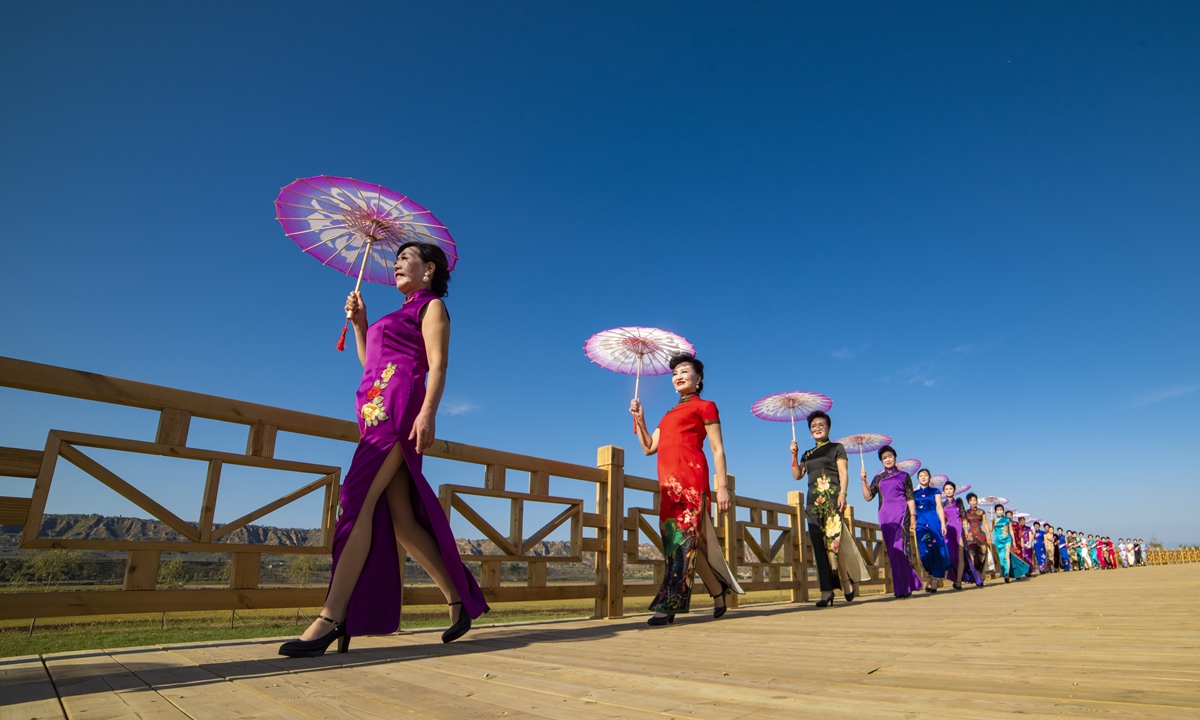Postponement of retirement age will match longer life expectancy, ensure pension sustainability

A group of retired women in colorful qipao, also known as cheongsams, walk down the “T stage”, an ecological gallery by the Yellow River, in Central China’s Henan Province. Photo: IC
Postponement of the retirement age, a contentious topic in China, received public attention and heated debate during this year’s two sessions, and experts said there is an urgent need to adjust the retirement policy to match the country’s rising life expectancy and economic development, and to guarantee the sustainability of pension funds, analysts said.
The closing meeting of the National People's Congress (NPC) on Thursday approved the government work report, which for the first time mentioned postponing the retirement age as a target for the new five-year plan.
The working age extension was raised in the 13th Five-Year Plan (2016-20) but did not appear in the government work report in 2016. The minor change was interpreted as a signal that the retirement would be raised again in the near future.
Deputies also raised a number of proposals concerning extension of working age or support for the elderly.
Li Hongxia, an NPC deputy and a research fellow with a fireproofing material company in Luoyang, Central China’s Henan Province, proposed postponing female scientists’ and technicians’ retirement to the age of 60 and for female professors to 63.
Sun Jie, a professor at the University of International Business and Economics and a member of the Standing Committee of the CPPCC, noted the importance of a national mechanism to plan for the pension system as a whole given the huge gaps between different regions.
Other proposals concerning the topic include diversifying pension sources by allowing more commercial insurance and to engage more social resources in the area.
The heated discussions came at a time when the 14th Five Year Plan (2021-25) mentioned implementation of progressive, flexible retirement age postponement.
A detailed plan has not been released yet, but China is likely to postpone the retirement age by five to 10 years in a gradual way, so that people will not feel a sharp change, according to Chu Fuling, head of the China Social Security Research Center under the Central University of Finance and Economics.
The US and Germany plan to raise the retirement age from 65 to 67, and China’s current retirement age is quite early by comparison, analysts said.
China has the biggest elderly population in the world and its retirement age has been unchanged since the 1950s – it is 60 for men and 55 for women (50 for those engaged in physical labor). In the same period, China’s average life expectancy increased from roughly 40 to 77.3 in 2019.
The US life expectancy is 78.6 years and the average retirement age is 66 or above for men. Among other major economies, most EU countries set it at 65 with gradual postponement. Japan sets 62 as the earliest age but people sometimes work up to 10 more years in a bid to get higher pensions.
Chu noted a flexible retirement age policy would allow people with health problems or in dangerous industries to retire early while other people work for more years.
The move would allow people to make the best use of their knowledge and skills as more and more people are having longer years of receiving education and are starting work later, Chu said.
Postponing the retirement age can help guarantee the sustainability of the pension funds, so to relieve the burden on young generations while ensuring a steady increase in pensions, analysts said.
